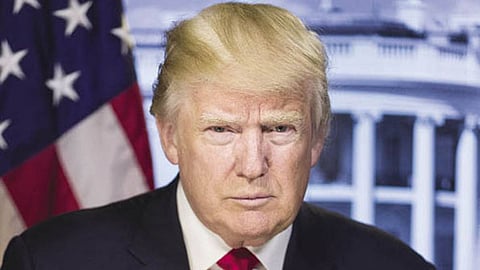Trump's trade squeeze
Calling India a ‘tariff king’, Donald Trump had put a squeeze on India’s exports to the US, unmoved by the attention he was getting from the Modi government. In fact, Trump’s role in the deterioration of Indo-US economic relations in recent years has rarely got the attention it deserves. This is despite the fact that Trump, a businessman, was expected to herald a new dawn. With the collapse in economic growth owing to the Covid-19 pandemic both in India and the US, supportive economic ties could have salvaged the situation to some extent.
Last year, when Trump and Modi walked hand in hand into a Houston stadium for the Howdy Modi event, the US had just raised tariffs on 14 per cent of Indian exports, including steel, aluminium, textiles and jewellery. New Delhi retaliated thereafter by making California almonds and Washington apples costlier. There was talk of a mini-trade deal and despite Trump’s claim of ‘tremendous progress’, there is no outcome till now.
On the contrary, the Trump administration queered the situation by relentlessly raising tariffs on Indian goods, altering visa terms for software engineers working in that country and raising concerns over medical device price caps as well as digital economy issues. The biggest area of friction has been trade and tariffs. In an increasingly protectionist era, both governments have become trigger-happy in terms of import duties.
The battle began with the US President deciding to focus on countries with which it had a high trade deficit. India was ranked 10th on the list of such entities in 2016 with a $24.3 billion deficit coming down to $23.3 billion in 2019. Negotiations on this issue had been continuing for quite some time with India trying to buy more by importing American crude oil and LNG. However, the scenario turned murky last year with Washington’s sudden decision to drop this country from the group of developing economies entitled to duty free import tariffs. Known as the Generalised System of Preferences (GSP), the scheme launched in 1975 enables duty free import of goods into the US by developing countries.
India was the largest beneficiary of this programme in 2017 with $5.7 billion worth of goods covered by it. Commerce Ministry officials maintained the withdrawal of concessions would have little impact since the actual benefit amounted to only $190 million annually. But it effectively highlighted the cavalier attitude towards India’s concerns. The reason given for the withdrawal of GSP benefits was the lack of market access provided to American products in this country. Market access issues, however, are not new and have been under negotiation for many years now.
Tariff hikes affecting Indian products have also taken place with little consideration for the close strategic ties. The latest round of increase in import duties was on aluminium products from 18 countries, including India, in the first week of October 2019. This is the second wave of tariff hikes on metals. The first came in 2018, when duties were raised by 25 per cent on steel and 10 per cent on aluminium from India and several other countries. India finally retaliated to these measures as well as withdrawal of GSP by imposing higher tariffs on many US imports in June last year. These included apples, almonds, chickpeas, lentils, steel and chemicals. A mini trade war had erupted.
The visa policy for highly skilled software professionals has also been revamped, making it more expensive to hire foreign personnel. This is an issue that affects the Indian and the American information technology industries but the policies are becoming more restrictive than ever in the past.
On its part, the US administration has complained about India’s rigid attitude on several key issues, including the imposition of price caps on medical devices like stents and implants. These were imposed in 2017 and staunchly opposed by American manufacturers. Other criticisms include the failure to allow market access to dairy products on religious grounds as well as long standing issues over intellectual property rights. While President Trump was vocal about the high tariffs on imports of Harley Davidson motorcycles, these are actually bought in minuscule numbers in this country. In contrast, the more relevant issues concerning American corporate investors are the continuation of foreign investment limits in key sectors like insurance, banking and retail. The proposals for a new e-commerce policy and data protection issues have also come under the spotlight. The Modi government, meanwhile, is focussed on its Atmanirbhar (self-sufficiency) drive.
India Inc, while welcoming the election of the Biden-Harris, will be now hoping that the new team steers the bilateral discourse away from trade tariffs, which had become an obsession with Trump. The most telling comment came from Anand Mahindra, chairman, Mahindra Group, who said that a leader’s words, policies, personality, decency and values always matter.

